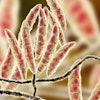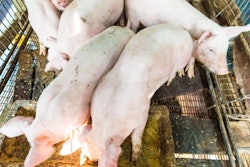
Several countries in Europe, Asia and Africa have registered new cases of African swine fever.
So far this week, only Poland and Serbia among the European countries has reported new cases of African swine fever (ASF) in domestic pigs.
The latest Polish outbreaks — three in number — have involved a total of 392 pigs, reports the country’s chief veterinary office. Confirmed by positive tests this week, cases were identified at two premises in Lublin, and one in Subcarpathia (Podkarpackie). Both of these provinces are in the southeast of the country. Two of the affected herds were small, but one of the Lublin premises was larger, with 360 pigs.
These latest outbreaks bring the Polish total since March to 93. Including 15 larger herds of at least 300 animals, the number of pigs involved in the outbreaks so far this year has risen to almost 56,000.
In recent days, the veterinary authority in the Republic of Serbia has officially registered 15 ASF outbreaks in domestic pigs.
According to the report to the World Organisation for Animal Health (OIE), these affected backyard herds of up to 147 animals in the east of the country. In outbreaks between June 29 and September 15, 208 pigs were lost to the disease through mortality or culling in Serbia.
Ukraine declares ASF situation ‘resolved’
The ASF situation in Sumy oblast has been “resolved,” according to the Ukrainian animal health agency.
After an absence of almost one year, ASF returned to this northern region at the end of May, when the virus was detected on a small farm. In early August, there was a second outbreak among a backyard herd, but there have been no further cases in Sumy since that time.
More ASF cases in wild boar in 5 European states
Since Germany’s first case of ASF was detected in a wild boar this month, the number of these animals that have tested positive for the virus has risen to 29.
According to the latest official report to the OIE, 16 wild boar have been confirmed with the infection since September 17. As with earlier cases, these animals were all found in the eastern state of Brandenburg. So far, the infection has been confined to two municipalities (Schenkendörben in Spree-Neisse district, and Neuzelle in Oder-Spree).
ASF virus has not so far been detected in any of Germany’s domestic pigs.
Other European states reporting new cases of ASF among their respective wild boar populations to the OIE this week are Hungary (52 animals), Serbia (20) and Latvia (2).
Philippines retrospectively registers 72 ASF outbreaks
Over the past week, the Department of Agriculture has recorded a further 72 outbreaks of ASF with the OIE.
Starting between December 6, 2019, and August 28, 2020, these involved more than 33,500 pigs across 14 provinces on the island of Luzon. The great majority of these outbreaks affected backyard pig herds, but six involved commercial farms — two each in the provinces Camarines Sur and Laguna, and one each in Pangasinan and Rizal.
Twenty-two of the reported outbreaks have occurred since the start of August.
ASF was first detected on Luzon at the end of July 2019, when a cluster of outbreaks occurred in Rizal province. Latest cases bring the total to 427 outbreaks, directly impacting more than 307,000 pigs.
A joint project between industry and academia has received funding of PHP5 million (US$103,000) to verify an ASF test kit.
According to Philippine News Agency, the funding has been provided by the Philippine Council for Agriculture, Aquatic and Natural Resources Research and Development. It will support a verification project involving Central Luzon State University and the Bureau of Agricultural Industry. Since July, samples have been collected from farms infected with ASF virus. Currently, a nano-biosensor is being tested to verify the virus detection rate.
Developed locally, the kit is being tested on samples of blood, saliva swab, feces and spleen. Placed in a tube with premixed solution, the sample is heated. A color change indicates presence of the virus. Initial results showed a positivity rate of around 75%. This is comparable to the results from the reverse transcription-polymerase chain reaction (RT-PCR) test, according to the Council’s executive director.
More cases in southern Vietnam
Between August 30 and September 10, three more village herds tested positive for the ASF virus, according to the agriculture ministry. Its latest report to the OIE indicates the disease was detected in three districts of Ca Mau province in the Mekong Delta region over this period. Seven of the pigs died, and the remaining 14 have been culled.
Previously, the ministry registered 181 outbreaks to the OIE. Starting between April 15 and July 1, these cases were concentrated in the south and north of Vietnam.
Up to September 17, OIE has recorded a total of 8,976 ASF outbreaks in Vietnam. Since the first occurrence in February 2019, cases have occurred in all 63 administrative divisions of the country. More than 1,470 outbreaks are reported as ongoing, and some clusters have covered multiple separate outbreaks. Vietnam has so far lost almost 5.972 million pigs to the disease.
Call for cull in Assam state, India
To control the spread of ASF, up to 12,000 pigs are to be culled in the state of Assam. New Indian Express reports the animals are all located within one kilometer of the 30 epicenters identified across 14 districts of the northeastern state.
The order for the cull came from the state’s chief minister, who asked officials to ensure that the affected owners receive adequate compensation for their animals.
According to the OIE, India reported the first occurrence of ASF in May. However, the first outbreaks started at the end of January. Eleven outbreaks are ongoing. All are near to the borders with China, Myanmar, Bhutan and Bangladesh.
Foundation called on to tackle ASF in Nigeria
To develop a lasting solution to ASF in Nigeria and West Africa generally, collaboration is needed between industry stakeholders. The chairman of livestock company Folhope Ltd. has called on nonprofit organization The Livestock Industry Foundation for Africa (LIFA) to bring the parties together, reported Nigerian Tribune.
In Nigeria, ASF has now become so rampant that profitable pig production is impossible, the executive said.
View our continuing coverage of the global African swine fever situation.

















